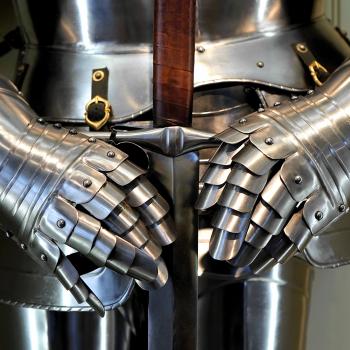To Train Up A Child, chapter 7
This chapter is also short, so we’ll do it in one go. It’s called “Philosophy of the Rod.”
THE TEACHING ROD
The growth of a child under the tutorship of the parents is time spent in God’s moral workshop being fitted for heavenly citizenship. As the child develops, the parents should accurately recapitulate the moral government of our Holy God. The rod is the parents’ main tangible aid to bring the child to understand the judgment of God—and eventually the grace of God.
This comparison between the chastisement of God and application of the rod is a common theme in Michael’s writing. Just as God punishes his human beings both here on earth and with hell, parents are to punish their children with the rod. What’s really interesting is that proponents of gentle discipline often contextualize their beliefs about parenting with their belief in a gentle and loving God. Michael seems to do the opposite, promoting parenting that reflects a stern and wrathful God.
To the small child, the father and mother are the guardians of all law, the protectors of truth and the dispensers of punishment and reward. The parents are a window through which the child gets his first impressions of the foundation principles of Divine government. If you make rules and do not respect them enough to enforce them, you will be making a statement about law in general. Your responses to transgressions are stage-playing the responses of God. By application of the rod they will understand their accountability to God. Unless all transgression, rebellion and meanness of spirit be treated as God treats sin, the child’s world view will be false.
Here you see this same theme drawn through, and again it is prefaced on Michael’s view of God. Proponents of gentle discipline would point out that God also forgives, and that the parent, too, should be quick to forgive, but Michael’s God doesn’t seem to include these traits. “All transgression” must be treated “as God treats sin”—which means, for Michael, whipping children with plumbing supply line or belts.
The military uses real bullets in training the men to avoid enemy fire. Replacing the rod with hollow threats would be to your children like replacing live bullets with firecrackers. It would get the men killed later on.
So, interesting thing. I showed this quote to two military wives I know, and asked them if it’s accurate. It’s not. The military never uses live rounds in training—except for target practice, of course. They used to use blanks to simulate being under enemy fire, but now they use a sound system. In fact, they sometimes use firecrackers to simulate grenades. So I think we can add the military to the list of things Michael thinks he knows about but doesn’t.
Therefore, the proper use of the rod is indispensable to a complete world view, for the rod completes the concept of law and accountability. If temporal authorities do not honor the law enough to enforce it with punishments, how could the child believe the great eternal authority will be any different?
Let me repeat something I have said again and again: While parents must prepare children to function as independent and responsible adults in the real world, they do not have to replicate the real world within their own homes to do that. The home isn’t supposed to be a reflection of military boot camp or the criminal justice system. The home is different from those other institutions because the family is, ideally, a unit based on love and common bonds. Replicating military boot camp or the criminal justice system in the home is unhealthy if not actually abusive.
THE FEAR OF GOD
A child must take seriously the moral law. “The fear of the LORD is the beginning of wisdom (Prov. 9:10).” In defining the root of sin, Paul said, “There is no fear of God before their eyes (Rom. 3:18).” The proper use of the rod teaches a wholesome fear. Do not fall victim to the modern rewriting of “fear” as “respect.” For Jesus said, “But I will forewarn you whom ye shall fear.’ Fear him, which after he hath killed hath power to cast into hell,’ yea, I say unto you, Fear him (Luke 12:5).” The Scripture makes a distinction between honor, love, and fear: “Honour all men. Love the brotherhood. Fear God. Honour the king.” (1 Pet. 2:17)
Though we don’t have “the spirit of fear,” we who understand eternity fear to be in opposition to the “Avenger” of all evil. Remember, you are preparing your child for real living in a real world and to face a real God in a real judgment of real accountability to a reward in a real eternity. This is no game; the rewards are great, the loss too horrible for a parent not to make this top priority.
Okay but wait. Michael has been saying that the parent stands in the place of God, that the child learns to relate to God by how they learn to relate to their parent, that the parents application of the rod mirrors God’s chastisement of those who disobey him and his law. So if adults are to fear the vengeance of God, does this mean children are to fear the vengeance of their parents? Michael gets so close to actually saying this here that I can’t help but think that this is what Pearl followers reading this passage would naturally come away with. I mean, this really is the conclusion of Michael’s logic here.
UNDERSTANDING GRACE
The end a Christian has in view is not just submission to the rule of law, but that the child should understand the grace of God. Only through the naked sword of the law do we understand grace. White is invisible until it is placed against a dark backdrop. The law is “our schoolmaster to bring us unto Christ (Gal. 3:24).” God could not show Himself on Mount Calvary until He first showed Himself on Mount Sinai.
By strictly enforcing the rules of the household through legislation, accountability and punishment, you not only teach them to fear and respect the Lawgiver, but you create opportunities to demonstrate grace. What a sacred responsibility!
Wait. Wait. Wait. Christians are no longer under the law. As the teaching goes, or at least as I learned it as an evangelical, the law laid out in the Old Testament was intended to show the Israelites that they could not measure up to God’s standards on their own. Then Jesus came and served as the sacrifice to pay for all of their shortcomings, and today we operate under the law of grace rather than under the law. Michael seems to be saying that parents should be imposing the law rather than allowing their children to live under grace, because only if children are raised on the law can they then understand grace. This is yet one more of Michael’s theological particularities.
It is important to understand the gravity of what Michael is communicating to parents. His endorsement of raising children on “the naked sword of the law” is particularly chilling. What he is saying is that parents do not have to worry about things like grace—i.e. free and underserved favor—as they must first raise their children on the hard, cold law, or their children will be unable to understand grace. This is sick, and it is no way to raise a child. When I read a passage like this I think of Hana Williams’ mother reading this passage, and determining that she must not give Hana any leeway or back down from enforcing the hard, cold dictates of her rules and dictates. And Hana ended up dead.
And then Michael finishes with this:
Having clarified some important issues on the application and philosophy of the rod, let us return to our discussion on training.
This chapter is titled “philosophy of the rod.” So let’s do a quick recap. Parents, Michael says, are to stand in the place of God and exercise judgement on their children, and to hold their children to the law they lay down as though it was God’s law. Michael says that parents should not seek to parent with grace (free and undeserved favor) but with the “naked sword” of the law. Furthermore, man should live in fear of God’s vengeance and judgement, and it is thus directly implied that children, too, should live in fear of their parents’ vengeance and judgement. Finally, Michael invokes the military and the criminal justice system as he lays out what amounts to a divine dictatorship in the home, man in the place of God. This, then, is Michael’s twisted, toxic “philosophy of the rod.”














